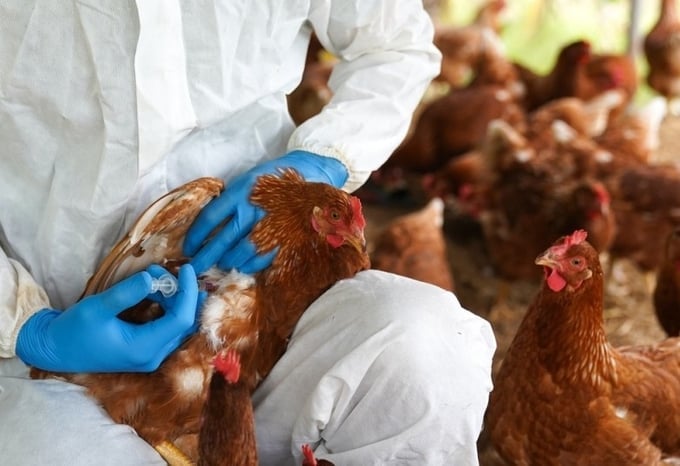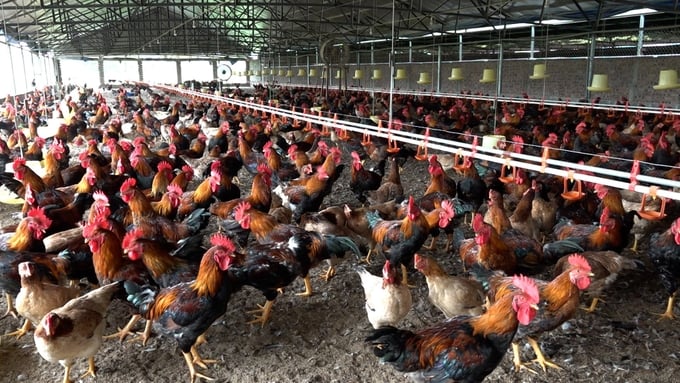May 20, 2025 | 18:51 GMT +7
May 20, 2025 | 18:51 GMT +7
Hotline: 0913.378.918
May 20, 2025 | 18:51 GMT +7
Hotline: 0913.378.918
On April 9, the Ministry of Agriculture and Rural Development issued Document No. 2560/BNN-TY, addressed to the province- and city-level People's Committees, regarding the centralized organization of vaccination against animal diseases for livestock.
The document indicated that, according to reports from the veterinary management authority, Vietnam experienced six outbreaks of avian influenza A/H5N1 in six provinces and cities within the first three months of 2024. As a result, nearly 9,000 poultry were culled. Additionally, one case of fatal avian influenza A/H5N1 virus infection in human was confirmed, and one case of avian influenza A/H9 virus infection in human is currently undergoing treatment.

Local governments are slow to approve and allocate funds for disease prevention and control, as well as allocate funds for vaccine procurement and vaccination programs. Photo: HT.
As of April 9, Vietnam recorded 159 outbreaks of African Swine Fever across 30 provinces. As a result, nearly 5,000 pigs were culled, marking an increase of over 60% compared to the same period in 2023.
Furthermore, 26 outbreaks of Foot and Mouth Disease were recorded across 9 provinces, reflecting a 31% increase; 43 outbreaks of Lumpy Skin Disease were recorded across 5 provinces; and 101 cases of rabies in animals were recorded across 25 provinces.
Active surveillance results revealed that the widespread circulation of the aforementioned pathogens are rapidly occuring at a high rate.
The high risk of dangerous diseases spreading among livestock and potentially transmitting to humans can result in considerable economic losses, restricted livestock development, and adverse effects on public health and the environment.
Real-time inspections conducted across various regions indicate alarmingly low vaccination rates, with many areas falling below 10%. Namely, a sizeable number of domestic animals, poultry, and livestock have either survived their immunity period or have not received any vaccinations.
Local governments have been slow to approve and allocate funds for disease prevention and control, as well as allocate funds for vaccine procurement and vaccination programs.
Additionally, a small number of local governments face difficulties in tendering vaccine procurement, or in coordinating approval of vaccination plans between district and provincial levels. Consequently, these inconsistent vaccination plans failed to meet disease prevention requirements.
The Ministry of Agriculture and Rural Development has issued numerous instructions regarding disease prevention and vaccination activities, with a focus on the use of vaccines against avian influenza, rabies, African Swine Fever, Foot and Mouth Disease, and Lumpy Skin Disease. However, the implementation of these instructions at the local level, especially at the district and commune levels, has been ineffective, resulting in the widespread outbreak of diseases.
In order to prevent the outbreak of dangerous diseases and their transmission to humans, the Ministry of Agriculture and Rural Development urged the Chairpersons of province- and city-level People's Committees to focus on directing their respective Departments, sectors, and local governments in implementing disease prevention measures in accordance with Law on Veterinary Medicine; implementing legal documents under the Law on Veterinary Medicine; implementing national programs and plans approved by the Prime Minister, as well as directives and instructions issued by the Prime Minister. Key focus areas include:
Urgently approving and allocating resources and funds for timely and effective implementation of: National Avian Influenza Prevention and Control Plan from 2019 to 2025; National African Swine Fever Prevention and Control Plan from 2020 to 2025; National Foot and Mouth Disease Prevention and Control Plan from 2021 to 2025; National Lumpy Skin Disease Prevention and Control Plan from 2021 to 2025; National Rabies Prevention and Control Plan from 2022 to 2030.
Compiling accurate statistics on the total livestock population and the number of animals eligible for vaccination against each disease in their respective areas; disseminating information regarding the dangerous nature of the diseases, the benefits of vaccinating livestock, and regulations on penalties for violations.

The Ministry of Agriculture and Rural Development requested local governments to accurately compile statistics on the total livestock population, as well as the number of animals eligible for vaccination against each disease in their respective areas. Photo: Hong Tham.
Urgently implementing the first phase of the mass vaccination campaign in 2024, which will take place from April to May 2024. Notably, the campaign will focus on vaccination against avian influenza (including the use of A/H5 and A/H9 avian influenza vaccines to reduce the risk of A/H9 avian influenza infection, thereby decreasing egg production and minimizing the risk of transmission to humans), rabies, anthrax, African swine fever, foot-and-mouth disease, lumpy skin disease, among others; reviewing previous vaccination campaings, administering additional vaccinations, and ensuring that at least 80% of the livestock population is adequately vaccinated with the correct type of vaccine.
Organizing vaccination against African swine fever in compliance with the Ministry of Agriculture and Rural Development's Document No. 4870/BNN-TY dated July 24, 2023, regarding the use of African swine fever vaccine.
Providing comprehensive, timely, and accurate reports on the state of disease outbreaks and vaccination results through the online Vietnam Animal Health Information Management System (VAHIS).
Directing local Departments of Agriculture and Rural Development and People's Committees to establish inspection teams. These teams will be responsible for overseeing and supervising local animal disease prevention and control efforts, as well as the progress of local vaccination campaigns.
Translated by Nguyen Hai Long

(VAN) In 2024, over 295 million people across 53 countries and territories faced acute hunger—an increase of almost 14 million people compared to 2023, while the number of people facing catastrophic levels of hunger reached a record high.

(VAN) World Environment Day 2025 (June 5) carries the theme 'Beat Plastic Pollution' continuing to emphasize the global urgency of addressing the plastic waste crisis.

(VAN) This was the assessment shared by experts at the workshop titled 'Assessing the Role and Potential of Low-Emission Rice Production Systems in Vietnam,' held on the morning of May 19.

(VAN) Cai Rong Port is the fisheries control center of Quang Ninh, helping to monitor fishing vessels, combat IUU fishing, and remove the EC's 'yellow card'.

(VAN) The German Agricultural Society (DLG) explores the possibility of establishing a mechanization service center in Vietnam’s Mekong Delta to support farmers in accessing and utilizing advanced machinery.

(VAN) On May 16, the Department of Water Resources Management, in collaboration with the Food and Agriculture Organization of the United Nations (FAO), held a signing ceremony for the GEF-8 project document.

(VAN) Food safety, mechanization, vocational training, and market opening are key areas of cooperation expected between the Vietnamese Government and the Federal Republic of Germany.